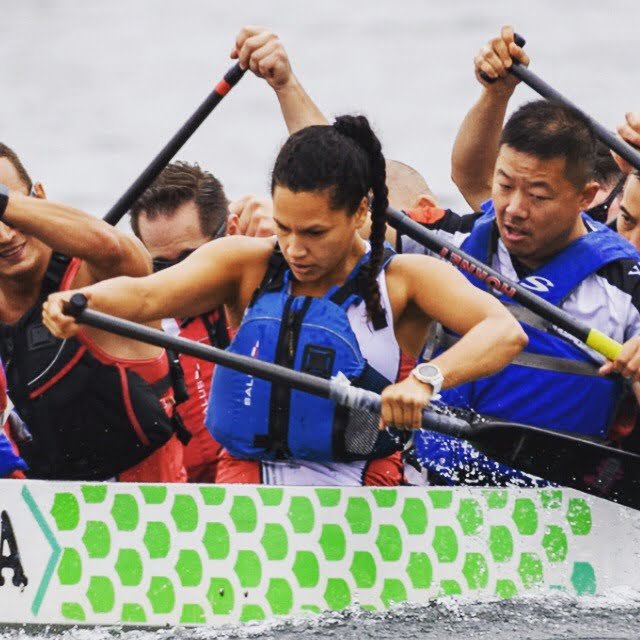A Para Athlete’s Struggle with Body Dysmorphia, Anorexia Athletica, and Major Depressive Disorder
By Randy Pinsky
‘Para athlete’ conjures up images of high performing athletes who have overcome physical challenges or disabilities to succeed in their chosen sport. The International Dragon Boat Federation (IDBF) has gone a step further and also includes a category on psychological issues. In doing so, it has demonstrated a remarkable openness to – and validation of – the range of challenges athletes grapple with.
Catie Sahadath (2017 Emerging Leader of The Library and Information Technology Association) is one such para athlete.

A former paddler with the formidable Ottawa Dragon Boat Club Premier Women (originally, The Galley Girls[1]) and currently with Hana Nui of the Pickering Dragon Boat Club, she has been to the Club Crew World Championships, and is preparing for Nationals in Montreal this August.
She courageously shared her story dealing with body dysmorphia, anorexia athletica, and depression.
It’s Okay to Not Be Okay
“Dragon boating is progressive in that it recognizes psychological challenges for para athletes,” shared Sahadath. “I’m proud to be a part of this sport.”
Indeed, the IDBF defines ‘Paradragons’ as “paddlers who are living with some form of physical, psychological, neurological, sensory, developmental, or intellectual impairment.”
The problem with psychological challenges is that the struggle is often private due to stigma and misunderstanding. Top athletes are expected to be stoic beings, with superhuman control of their physical prowess and mental state. Those fighting a secret internal battle therefore often hide issues out of fear of judgment and subsequently do not receive the support they need.
‘But You Look Fine!’ As noted by Sahadath, “depression and anxiety are not like light-switches”. You can’t just ‘decide’ to ’not be anxious’. Athletes’ own often impossibly high standards are compounded with the expectations of their teammates and coaches. They must keep up a facade of always being in control and resilient, for fear of exposing vulnerabilities to the competition, or being a liability to their own team.
That’s why resources such as the Canadian Center for Mental Health and Sport are so critical, providing exercises for managing stress and triggers. Sahadath suffers from Major Depressive Disorder (MDD), which she describes as “a sort of brain paralysis,” which can prevent her from being able to undertake normal daily activities. “I want to do things but sometimes I just can’t; The struggle is real.”

From Solo to a Team Sport
The camaraderie of dragon boating is what originally drew Sahadath to the sport; so different from the swimming she competed in as a teenager. The feeling of accountability to others can be crucial for those with fragile self-confidence. “Like it actually mattered,” she explained, “that there is something ‘bigger than oneself.’”
Since starting paddling with her high school team in Pickering, Ontario, she always seeks a team wherever she goes- whether for university (Toronto, Vancouver), work (Calgary, Ottawa), and “back full-circle” to Pickering. In 2016, she became more competitive, working up the ranks till she was accepted to Premier. She is now part of the Pickering Dragon Boat Club (PDBC)’s Hana Nui team, which means ‘hard work’ in Hawaiian.
Hana Nui It Is
And there was a lot of ‘hana nui’ and adapting during the pandemic! With restrictions constantly changing, “Everyone just got better at running and loading boats on cars!” laughed Sahadath.

Through training at Alkame Paddlezone and the AfterBurn indoor tank at half capacity, the team worked to stay active.
PDBC competed at the Tampa International Dragon Boat festival in April 2022, coming in second overall; Sahadath’s first post-pandemic race since Quebec Cup 2019. “It was truly a great way to start the season and our return on the water.”
Body Dysmorphia and Anorexia Athletica
Sahadath’s depression is linked to body dysmorphia; a mental health condition that affects many athletes and causes people to have a distorted perception of their body. No matter what others say, individuals have difficulty perceiving their bodies in a manner that is consistent with reality.

Sahadath’s own experience is linked to long-term childhood emotional abuse, and has been a trigger for her subsequent eating disorder and depression. “There have been days when I thought ‘I just can’t leave the house today, I can’t go to work, people will see how fat I am,’” she shared. “That’s the line between just having low self-confidence, and having a mental health condition.”
When Sahadath started to be more competitive in dragon boating, she became obsessed with losing weight to paddle. Every calorie was calculated, and every meal was immediately followed by a workout. “If I ate 300 calories for breakfast, I had to run 5km right away to work it off. I would skip important parts of my life like work and studying because I had to burn calories.”
Anorexia athletica is an eating disorder whereby an athlete will become consumed by the constant fear of gaining weight, and will use exercise as a means to purge calories. Many outsiders will not recognize the desperation behind the workout and thereby not see it as a problem. “While with other eating disorders, there are physical warning signs; with this one, it just looks like you’re getting really fit, really fast…I lost 50 pounds in one on-water season, and another 30 pounds in the off-season. It wasn’t healthy.”
Managing Triggers
Mental health supports including psychotherapy and sport-specific counseling have helped Sahadath enter the recovery phase of anorexia athletica. However, the underlying dysmorphia is a chronic condition that she must constantly manage. Triggers can present themselves without warning, causing severe episodes of depression.
One such instance occurred at the 2019 Montreal Challenge when Sahadath overheard someone comment on a paddler being ‘fat.’ Although the statement was not directed at her, she felt awash with self-consciousness and literally froze in place just moments before her team’s 2km race.
Through sheer autopilot, and with help from a teammate, she somehow made it to the marshaling area, and loaded onto the boat. Due to a physical symptom of depression called psychomotor retardation, she was unable to maintain a solid grip on her paddle, and thus lost it when she hit a steering buoy, having to duck and lean for the last 500m.
The Power of Words
One will not ‘conquer’ or ‘overcome’ depression, nor develop permanent coping strategies overnight.
But one can learn to manage it.
“I treat my situation like a chronic impairment, working on it every day,” shared Sahadath, using Cognitive Behavioral Therapy exercises to reinforce the desired mental change.
She has found visualizing races and practices to be calming as it removes the ‘unexpected’ by ‘going through it’ once. Her mantra of “I’m safe, everything is fine,” is also an integral component of her pre-race warm-up.
Feel the Feeling
Sahadath has learned the importance of acknowledging, naming, and allowing herself to experience the emotion, whether it be stress, anxiety or self-doubt. Only then can you take steps to address it.
In 2017, The Galley Girls’ winning streak ended with a crushing blow when they did not qualify for Worlds (“It was like someone had stepped on our sandcastle”). The athletes had to learn ‘grief management’ to sit with the emotion and address the disappointment.
Promoting Healthy Living; Both Physical and Mental
“Everyone is dealing with a secret struggle.” Carelessly made or tactless comments about body size and looks can have greater impacts than one might realize. As a result, Sahadath has become a vocal spokesperson about psychological issues.
“You just never know what other people are going through- being human is hard.”

**If you or someone you know is in crisis, contact Talk Suicide Canada at 1-833-456-4566 (call); 45645 (text; 4pm-midnight) to connect with a crisis responder.
Resources
Eating Disorders and Athletes, National Eating Disorders Association
Public Health Agency Canada – Mental Health Supports
[1] The team’s name was changed due to the reference to slave ships. As a person of color and in light of the Black Lives Matter movement, Sahadath pushed for a renaming, succeeding in March 2021.

